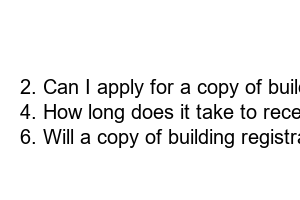건물등기부등본
Title: In-depth Guide to Obtaining a Copy of Building Registration
Introduction: Welcome to our comprehensive guide on acquiring a copy of building registration! Whether you’re a homeowner, real estate professional, or simply curious about property ownership, understanding the process and importance of obtaining this crucial document is essential. In this blog post, we will break down the steps involved, highlight key factors, and answer frequently asked questions regarding building registration copies.
1. Understanding the Significance of Building Registration
Building registration serves as legal documentation that confirms a building’s existence, ownership, and compliance with local regulations. It is a crucial document that provides necessary information for legal proceedings, property disputes, property sale/purchase, mortgage, taxation, and insurance purposes.
2. Identifying the Need for a Copy of Building Registration
There are several scenarios that may necessitate obtaining a copy of building registration. These include property disputes, property development plans, renting out property, obtaining financial loans against the property, or conducting historical research on a specific building.
3. Researching the Authority Responsible for Building Registration Copies
To obtain a copy of building registration, it is important to identify the appropriate authority responsible for maintaining and providing access to these documents. This could be the local municipality, regulatory authority, land records office, or the department of urban planning, depending on your jurisdiction.
4. Gathering the Required Documents and Information
Before approaching the relevant authority, it is essential to gather specific documents and information to expedite the process. These may include property address or identification number, proof of identity, proof of ownership or relationship to the property, and any associated fees or application forms.
5. Navigating the Application Process
To obtain a copy of building registration, applicants typically need to follow a specific application process outlined by the authority. This may involve visiting the office in person, submitting an online application, or sending a written request by mail. It is important to carefully adhere to the instructions provided and ensure all required information is accurately provided.
6. Timelines and Costs Involved
The time it takes to receive a copy of building registration may vary depending on the authority’s workload and efficiency. Some authorities may offer expedited services for an additional fee. It is advisable to inquire about the associated costs as they can vary from one jurisdiction to another.
7. Ensuring Accuracy and Authenticity of the Copy
Once the copy of building registration is obtained, it is important to verify its accuracy and authenticity. Carefully review the document to ensure it matches the property details and contains the necessary stamps, seals, or signatures. If any discrepancies are found, contact the issuing authority for clarification or correction.
Summary:
Acquiring a copy of building registration is a crucial step for property owners, buyers, and professionals in the real estate industry. By understanding the significance, identifying the need, researching the appropriate authority, gathering required documents, navigating the application process, and verifying the accuracy of the copy, you can ensure a smooth and successful experience. Remember, obtaining this essential document provides legal validation and peace of mind for various property-related matters.
FAQs:
1. How much does it cost to obtain a copy of building registration?
2. Can I apply for a copy of building registration online?
3. Can a copy of building registration be used as proof of legal ownership?
4. How long does it take to receive a copy of building registration?
5. Can someone else apply for a copy on my behalf?
6. Will a copy of building registration be accepted as valid proof in court?

